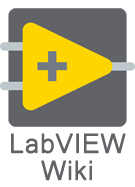Type Specialization structure
| |
This article is a stub. You can help LabVIEW Wiki by expanding it. Please improve this article if you can. |
| Object information | |
|---|---|
| Owning palette(s) | Structures palette | Assert Type palette |
| Type | VI |
| Requires | Basic Development Environment |
| Icon | |
The Type Specialization Structure has one or more subdiagrams, exactly one of which LabVIEW compiles and executes, depending on the order and the compilation result of the subdiagram. LabVIEW declines subdiagrams in order if they have syntax errors. LabVIEW accepts the first subdiagram that does not have syntax errors and ignores the remaining subdiagrams. If all subdiagrams have syntax errors, this structure accepts the last subdiagram. Syntax errors are errors within the structure, such as broken wires, not errors caused by subVIs or other dependencies.
Use this structure to customize sections of code in a Malleable VI (.vim) for specific data types. You also can use this structure in conjunction with the Assert Type VIs and functions to force a Malleable VI to accept only a subset of the acceptable Data Types or to decline specific data types.
Usage
After you create a Type Specialization structure, you can add, duplicate, rearrange, or delete the subdiagrams. To scroll through the available subdiagrams, click the decrement and increment arrows in the selector label. You also can remove the structure without deleting objects in the structure.
The Type Specialization structure allows you to disable specific sections of code on the block diagram based on compilation results. To disable specific sections of code on the block diagram based on some user-defined condition, use the Conditional Disable structure. To disable a section of a block diagram, use the Diagram Disable structure.
To switch to a Conditional Disable structure or Diagram Disable structure, right-click the border of the Type Specialization structure and select Replace with Conditional Disable Structure or Replace with Diagram Disable Structure from the shortcut menu.
Best practice
| |
Add other best practices for this function. |
History
| Version | Change(s) |
|---|---|

|
The Type Specialization structure was made public in LabVIEW 2018 |
See Also
External Links
| |
Add links to external resources that would also help. |
